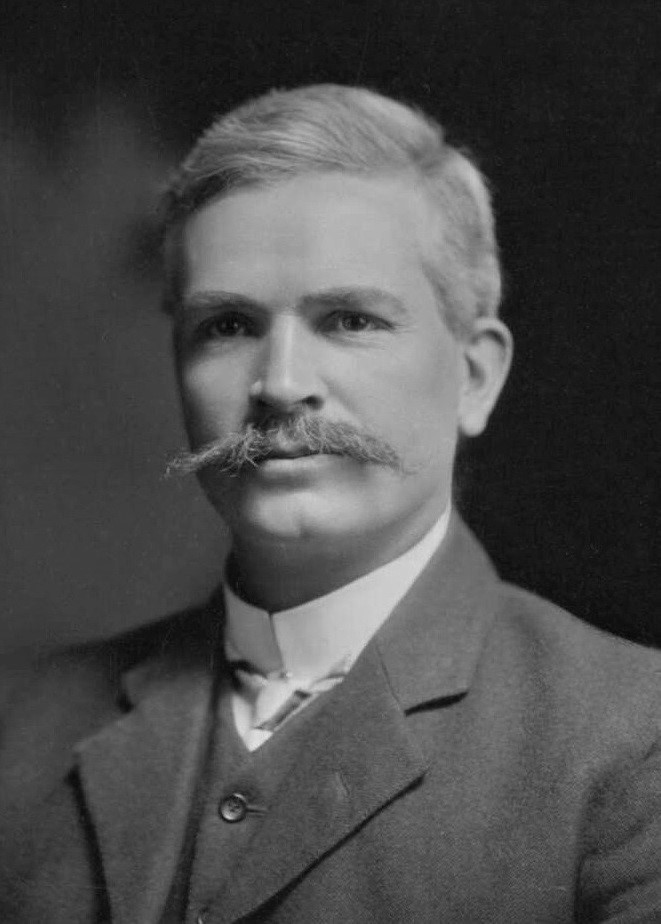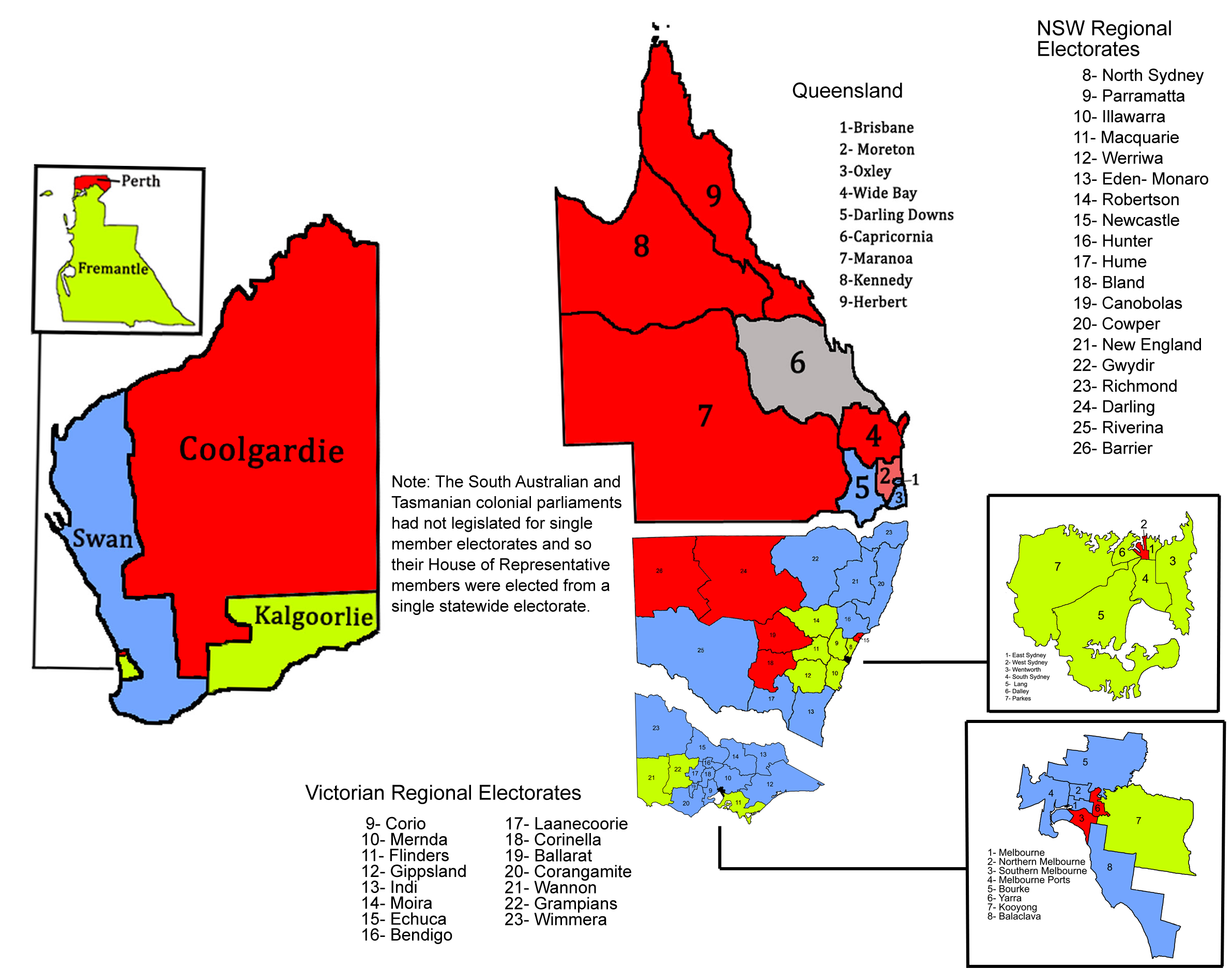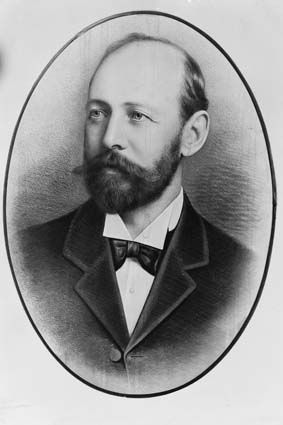|
Dugald Thomson
Dugald Thomson (28 December 1849 – 27 November 1922) was an Australian politician. He campaigned for Federation as a member of the New South Wales Legislative Assembly (1894–1901), and was subsequently elected to the new federal House of Representatives (1901–1910). He served as Minister for Home Affairs in the Reid Government from 1904 to 1905. Early life Thomson was born in Camberwell, London, England, to Scottish parents Jane (née Duncan) and John Thomson. His father was an insurance broker. The family emigrated to South Australia the year after he was born, and later moved to Victoria. Thomson completed his education in England and trained at his uncle's business in Liverpool. After spending two years at sea, he returned to Melbourne at the age of 19 and joined the merchant firm of Robert Harper. He set up a Sydney branch in 1877 and was a managing partner until 1892. He also established the North Shore Steam Ferry Company with James Garvan. New South Wales politics ... [...More Info...] [...Related Items...] OR: [Wikipedia] [Google] [Baidu] |
The Honourable
''The Honourable'' (British English) or ''The Honorable'' (American English; see spelling differences) (abbreviation: ''Hon.'', ''Hon'ble'', or variations) is an honorific style that is used as a prefix before the names or titles of certain people, usually with official governmental or diplomatic positions. Use by governments International diplomacy In international diplomatic relations, representatives of foreign states are often styled as ''The Honourable''. Deputy chiefs of mission, , consuls-general and consuls are always given the style. All heads of consular posts, whether they are honorary or career postholders, are accorded the style according to the State Department of the United States. However, the style ''Excellency'' instead of ''The Honourable'' is used for ambassadors and high commissioners. Africa The Congo In the Democratic Republic of the Congo, the prefix 'Honourable' or 'Hon.' is used for members of both chambers of the Parliament of the Democratic Repu ... [...More Info...] [...Related Items...] OR: [Wikipedia] [Google] [Baidu] |
Liverpool
Liverpool is a city and metropolitan borough in Merseyside, England. With a population of in 2019, it is the 10th largest English district by population and its metropolitan area is the fifth largest in the United Kingdom, with a population of 2.24 million. On the eastern side of the Mersey Estuary, Liverpool historically lay within the ancient hundred of West Derby in the county of Lancashire. It became a borough in 1207, a city in 1880, and a county borough independent of the newly-created Lancashire County Council in 1889. Its growth as a major port was paralleled by the expansion of the city throughout the Industrial Revolution. Along with general cargo, freight, and raw materials such as coal and cotton, merchants were involved in the slave trade. In the 19th century, Liverpool was a major port of departure for English and Irish emigrants to North America. It was also home to both the Cunard and White Star Lines, and was the port of registry of the ocean li ... [...More Info...] [...Related Items...] OR: [Wikipedia] [Google] [Baidu] |
Joseph Cook
Sir Joseph Cook, (7 December 1860 – 30 July 1947) was an Australian politician who served as the sixth Prime Minister of Australia, in office from 1913 to 1914. He was the leader of the Liberal Party from 1913 to 1917, after earlier serving as the leader of the Anti-Socialist Party from 1908 to 1909. Cook was born in Silverdale, Staffordshire, England, and began working in the local coal mines at the age of nine. He emigrated to Australia in 1885, settling in Lithgow, New South Wales. He continued to work as a miner, becoming involved with the local labour movement as a union official. In 1891, Cook was elected to the New South Wales Legislative Assembly as a representative of the Labor Party, becoming one of its first members of parliament. He was elected party leader in 1893, but the following year left Labor due to a disagreement over party discipline. He was then invited to become a government minister under George Reid, and joined Reid's Free Trade Party. In 1901, C ... [...More Info...] [...Related Items...] OR: [Wikipedia] [Google] [Baidu] |
William McMillan (Australian Politician)
Sir William McMillan (14 November 1850 – 21 December 1926) was an Australian businessman and politician. He was a member of the first federal parliament and served as deputy leader of the Free Trade Party under George Reid, but served only a single term before resigning. He had earlier served in the Parliament of New South Wales, including as Colonial Treasurer, and was prominent in the movement for Federation. He was born in Ireland and became a successful businessman in Australia after moving to Sydney at the age of 18. Early life McMillan was born in Derry, Ireland, he was the fourth child and third son of Rev. Gibson McMillan, a Methodist minister. William lived in Westport and Ballina, both in County Mayo, Ireland until the age of six. In 1856, his father was assigned to the Methodist church in Abbey Street, Dublin, and McMillan began his formal education. Along with his older brothers, John and Charles, he attended boarding school at Wesley College in St. Stephens G ... [...More Info...] [...Related Items...] OR: [Wikipedia] [Google] [Baidu] |
1910 Australian Federal Election
The 1910 Australian federal election was held in Australia on 13 April 1910. All 75 seats in the House of Representatives, and 18 of the 36 seats in the Senate were up for election. The incumbent Commonwealth Liberal Party (the result of a merger between the Protectionist Party and the Anti-Socialist Party) led by Prime Minister Alfred Deakin was defeated by the opposition Labour Party, led by Andrew Fisher. The election represented a number of landmarks: it was Australia's first elected federal majority government; Australia's first elected Senate majority; the world's first Labour party majority government at a national level; after the 1904 Chris Watson minority and Fisher's former minority government the world's third Labour party government at a national level; the first time it controlled ''both'' houses of a bicameral legislature; and the first time that a prime minister, in this case Deakin, was defeated at an election. It also remains the only election in Australia's ... [...More Info...] [...Related Items...] OR: [Wikipedia] [Google] [Baidu] |
1901 Australian Federal Election
The 1901 Australian federal election for the inaugural Parliament of Australia was held in Australia on Friday 29 March and Saturday 30 March 1901. The elections followed Federation and the establishment of the Commonwealth of Australia on 1 January 1901. All 75 seats in the Australian House of Representatives, six of which were uncontested, as well as all 36 seats in the Australian Senate, were up for election. After the initial confusion of the Hopetoun Blunder, the first Prime Minister of Australia, Edmund Barton, went into the inaugural 1901 federal election as the appointed head of a Protectionist Party caretaker government. While the Protectionists came first on votes and seats, they fell short of a majority. The incumbent government remained in office with the parliamentary support of the Labour Party, who held the balance of power, while the Free Trade Party formed the opposition. A few months prior to the 1903 election, Barton resigned to become a founding membe ... [...More Info...] [...Related Items...] OR: [Wikipedia] [Google] [Baidu] |
Australian House Of Representatives
The House of Representatives is the lower house of the bicameral Parliament of Australia, the upper house being the Senate. Its composition and powers are established in Chapter I of the Constitution of Australia. The term of members of the House of Representatives is a maximum of three years from the date of the first sitting of the House, but on only one occasion since Federation has the maximum term been reached. The House is almost always dissolved earlier, usually alone but sometimes in a double dissolution of both Houses. Elections for members of the House of Representatives are often held in conjunction with those for the Senate. A member of the House may be referred to as a "Member of Parliament" ("MP" or "Member"), while a member of the Senate is usually referred to as a "Senator". The government of the day and by extension the Prime Minister must achieve and maintain the confidence of this House in order to gain and remain in power. The House of Representatives c ... [...More Info...] [...Related Items...] OR: [Wikipedia] [Google] [Baidu] |
Federation Of Australia
The Federation of Australia was the process by which the six separate British self-governing colonies of Queensland, New South Wales, Victoria, Tasmania, South Australia (which also governed what is now the Northern Territory), and Western Australia agreed to unite and form the Commonwealth of Australia, establishing a system of federalism in Australia. The colonies of Fiji and New Zealand were originally part of this process, but they decided not to join the federation. Following federation, the six colonies that united to form the Commonwealth of Australia as states kept the systems of government (and the bicameral legislatures) that they had developed as separate colonies, but they also agreed to have a federal government that was responsible for matters concerning the whole nation. When the Constitution of Australia came into force, on 1 January 1901, the colonies collectively became states of the Commonwealth of Australia. The efforts to bring about federation in the m ... [...More Info...] [...Related Items...] OR: [Wikipedia] [Google] [Baidu] |
Dugald Thomson - Swiss Studios
Dugald may refer to: Places * Dugald, Manitoba, a town in the province of Manitoba, Canada People * Dugald Campbell Scottish doctor * Dugald Christie (1941–2006), Canadian lawyer and activist * Dugald Drummond (1840–1912), Scottish engineer * Dugald Malcolm (born 1917), British diplomat * Dugald McGregor, Australian rugby league footballer * Dugald Clark, Scottish Engineer * Dugald Semple (1884–1964), Scottish writer and simple living advocate * Dugald Stewart (1753–1828), Scottish philosopher * Dugald Sutherland MacColl (1859–1948), Scottish watercolour painter and art critic * Clinton Dugald MacDougall, American Representative from New York * Dubgall mac Somairle, also known as ''Dugald mac Somerled'', and ''Dugald MacSorley'' See also * Dugald train disaster, a Canadian National Railway train wreck between two passenger trains * Dugal Dugal is a surname with multiple origins. In some cases it is derived from the Gaelic personal name ''Dùghall'' (variously spe ... [...More Info...] [...Related Items...] OR: [Wikipedia] [Google] [Baidu] |
Australian Labor Party (New South Wales Branch)
The Australian Labor Party (New South Wales Branch), also known as NSW Labor, is the New South Wales branch of the Australian Labor Party. The parliamentary leader is elected from and by the members of the party caucus, comprising all party members in the Legislative Assembly and Legislative Council. The party factions have a strong influence on the election of the leader. The leader's position is dependent on the continuing support of the caucus (and party factions) and the leader may be deposed by failing to win a vote of confidence of parliamentary members. By convention, the premier sits in the Legislative Assembly, and is the leader of the party controlling a majority in that house. The party leader also typically is a member of the Assembly, though this is not a strict party constitutional requirement. Barrie Unsworth, for example, was elected party leader while a member of the Legislative Council. He then transferred to the Assembly by winning a seat at a by-election. W ... [...More Info...] [...Related Items...] OR: [Wikipedia] [Google] [Baidu] |
George Reid (Australian Politician)
Sir George Houston Reid, (25 February 1845 – 12 September 1918) was an Australian politician who led the Reid Government as the fourth Prime Minister of Australia from 1904 to 1905, having previously been Premier of New South Wales from 1894 to 1899. He led the Free Trade Party from 1891 to 1908. Reid was born in Johnstone, Renfrewshire, Scotland. He and his family immigrated to Australia when he was young. They initially settled in Melbourne, but moved to Sydney when Reid was 13, at which point he left school and began working as a clerk. He later joined the New South Wales civil service, and rose through the ranks to become secretary of the Attorney-General's Department. Reid was also something of a public intellectual, publishing several works in defence of liberalism and free trade. He began studying law in 1876 and was admitted to the bar in 1879. In 1880, he resigned from the civil service to run for parliament, winning election to the New South Wales Legis ... [...More Info...] [...Related Items...] OR: [Wikipedia] [Google] [Baidu] |



.jpg)





